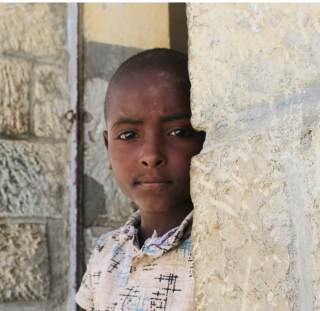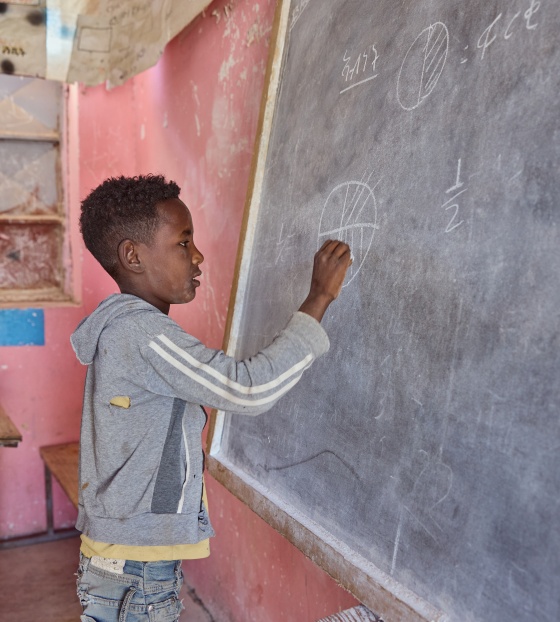

A tearful reunion: catching up with young Birhane after an unimaginable few years
Now, in schools where our meals are served in Tigray, young learners have the chance to engage with education again, and spend time with their friends, safe in the knowledge that they will receive a much-needed meal every day they attend classes.
When I first met Birhane he was in his first few years of school; a young boy with a shy smile who cuddled into his father as they posed for a photograph together. That was at the end of 2019. Back then, it would have been impossible to imagine the horrors young Birhane was to endure in the years that followed.
Now in Grade 4 and aged 13, he does have some memories of that visit.
“I was little then – last time you were here. I remember school, it was nice.”
I recognise his smile first, but it takes me a while longer to identify the face that holds it – he has grown so much in these intervening years. Years when he saw his school close – first because of the Covid-19 pandemic, then a devastating and brutal civil war that threatened to tear his country apart. And for two years, it did. Officially there is peace in Tigray now, but many marks of the war remain. And now a drought has hit the region and left its already bruised and battered people struggling to survive. Birhane and his family are no exception.
He says: “I should be in Grade 6 but for the last two to three years I was out of school, there was severe instability and hunger.
“We migrated to Wukro (a nearby town) during the war, we came back when school opened, but my mother is still there a lot of the time. She doesn’t regularly live in our home. She goes three days a week to work in Wukro and then she brings me food when she comes home.”
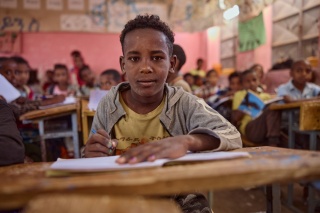
Other family members try to earn what little they can. Birhane’s eldest brother looks for work excavating stones – taking them from farming lands to sell for construction – but it’s rare as there is no real market for this at the moment. Their father works as a security guard for the school and, together, they look after Birhane’s other four siblings. But it’s his mother who is the biggest earner.
The sacrifices she makes to feed her family can be difficult for the children, but the impact of her not finding work is even worse and sadly Birhane knows this from experience.
He says: “When I saw my mum doing so much to find opportunities for us, I would feel stress and I wanted to support her, but I can’t. Sometimes our mum was just hungry and we asked her if we could help and she would say, ‘you are children, you keep quiet’.
“Sometimes she can’t get work and comes immediately back home. There’s not enough for a full meal at home when my mum can’t bring any money.
“If that happens, we all just try to sleep the whole day. We don’t have a choice.”
At this point in our conversation, Birhane’s beautiful smile cracks and he begins to cry. It’s clear that the stress of hunger, the prolonged absence from school, and the worries he has about his mother have taken their toll on him.
After such a cruel few years, this is the reality for children living in Tigray right now. It’s no wonder they feel scared about the future. What is remarkable, though, is their resilience in the face of such trauma, because it’s clear all hope is not lost.
For Birhane and his friends, that hope comes from the return of Mary’s Meals at his school. It comes from the smoke rising from the school kitchen and the shouts of children playing in the school yard – it comes from the promise of a nutritious meal every day he attends school.
He recalls: “During the conflict, my friends and I would talk about how much we loved this school, but we couldn’t come here, it was a very boring time.
“I remember one day we were ready to migrate to somewhere else, but the school opened and I saw the meals here and I immediately changed my mind and told my mother we had to stay here.”
Recounting this memory brings a smile back to Birhane’s face, as he explains: “When I saw it, I felt simply happy. “I am really satisfied with the food here, rather than home, because at home it is limited – sometimes we eat, sometimes we don’t. Sometimes we have to skip meals if my mum can’t bring money back.”
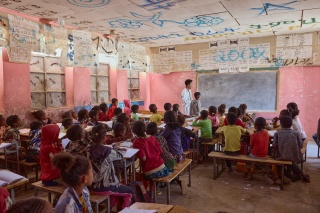
As Tigray finds itself in the grip of this hunger crisis, Mary’s Meals truly is a lifeline for Birhane. The pain of the last few years is still with him and the reality of days without food at home mean he relies on the meals he receives at school more than ever.
But those meals represent so much more than an easing of his hunger. Being back in school gives him some return to ‘normality’, where he gets to play and talk with his friends. The consistent promise of our meals served in school gives him the opportunity to focus on his education once more, which means he is able to work towards a very different future.
He tells me: “Now I am very happy at school, I am learning and understanding my subjects more and more. If you are properly educated, you can be a doctor, a teacher, you can get whatever you want. I just worried when school was off and we couldn’t get Mary’s Meals, that I would have to repeat [school years]. I was worried it would happen again.”
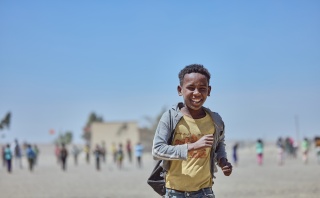
One the day I visited, Birhane was running around the school yard, playing with his friends and full of energy. It’s sad to think of the times this wasn’t possible and the long days he had to go without food. But it’s wonderful to see that he’s now back in school and receiving food, and it’s wonderful to hear him talk with such enthusiasm about the things that would excite any 13-year-old boy.
He says: “When I [came] back to school, I was playing with kids, I was eating my meals, because the meals fill our stomachs. The education is better now, so I enjoy being with my friends more.
“After the meal, [we] are together walking in the yard, running to our friends. I play football with my friends, I love football, I really enjoy to play.”
Across Tigray, there are hundreds of thousands of children struggling to get through long days without anything to eat. Their hopes of an education – and with it, any future prospects – dashed in their battle to simply survive this looming famine.
With your support, we can expand our school feeding programme and help to change their story, just like we have for Birhane. For those waiting, the daily pain of hunger doesn’t need to be their reality; we just need the funds to reach them. If we can, perhaps we will hear more children sharing the same message as Birhane did when I asked him what he might want to tell people:
“I would simply thank all of you; we are standing here because of Mary’s Meals.”
